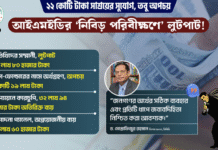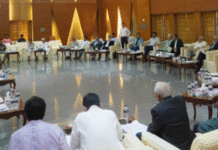
Myanmar military officers march during a parade to commemorate the 74th Armed Forces Day in Naypyitaw, Myanmar, March 27, 2019. (AP photo by Aung Shine Oo)
For Justice in Myanmar, Sanction the War Profiteers Financing Genocide
Candace Rondeaux Friday, Aug. 9, 2019 worldpoliticsreview.com
When the history of Myanmar’s genocide against the Rohingya people is finally written, it may read a lot like the cases of Rwanda and Yugoslavia. The International Criminal Court could eventually prosecute a few of the military officers responsible for killing and torturing thousands of Rohingya, a predominantly Muslim ethnic minority long persecuted in Myanmar. Chances are, though, that justice will be lumbering and uneven. Like others before them, most of the perpetrators will likely evade prosecution altogether.
History could turn out differently, however, if calls are heeded from the United Nations independent fact-finding mission in Myanmar to sanction the global network of war profiteers who are financing the genocide.
In a major investigative report released this week, the U.N. documents the economic plundering that has fueled the military’s “clearance operations” in Myanmar’s Kachin, Shan and Rakhine states. The report lays out a stark case for cutting off flows of weapons, oil, gas, gems and money that funded the displacement and dispossession of upwards of 740,000 Rohingya in 2017 alone. It names dozens of national and international firms that regularly do business with two state-owned conglomerates controlled by Myanmar’s military, Myanmar Economic Holdings Limited and the Myanmar Economic Corporation. In addition to naming more than 120-plus subsidiaries linked to the military that are profiting from the pillage of areas once populated by Rohingya Muslims and other religious minorities, U.N. investigators specifically singled out Chinese, Israeli, Russian, Ukrainian and North Korean suppliers of weapons to Myanmar.
In Kachin, a province on Myanmar’s northeast border with Bangladesh, the military—or Tatmadaw, as it is known—has leveraged its seizure of mineral-rich mountains to bulk up its war profits. Mountains holding vast deposits of jade have been strip-mined by local laborers working under constant watch of the military. While Global Witness and other international NGOs have recently documented the sprawling network of Tatmadaw conglomerates, subsidiaries and financiers behind Myanmar’s $31 billion trade in what it calls “genocide gems,” no organization until now has so thoroughly and explicitly outlined the nexus between the foreign arms suppliers, bankers and commodities brokers that all do business with the Tatmadaw.
The U.N. report comes nearly a year after investigators publicly declared that top military commanders should be charged with committing genocide and other crimes against humanity during army sweeps in areas of the country populated by the Rohingya. Detailed public records of the Tatmadaw’s business dealings are hard to come by, but U.N. investigators have assembled an impressive body of evidence from open sources on how its military operations have been financed. Investigators found that one part of Myanmar Economic Holdings Limited, known as the Patron Group, consists of high-ranking military officials who hold controlling stakes in the state-run gem, gas, oil and coal mining industries. Their report expressly named the army’s commander-in-chief, Senior Gen. Min Aung Hlaing, and its deputy commander-in-chief, Vice-Senior Gen. Soe Win, as the Patron Group’s top leaders. As if that weren’t enough, top generals also pressed 45 companies in Myanmar for donations worth upwards of $10.2 million to support military operations in northern Rakhine state in 2017, according to the report.
The U.N. report on Myanmar echoes a growing consensus that the only sure path to bringing war criminals to account is to follow the money and prosecute the profiteers.
Myanmar’s civilian government issued a statement a day after the report was published saying it categorically rejects the U.N. findings. It wasn’t surprising. The world now seems weary of asking just what happened to Nobel Prize winner Aung San Suu Kyi to turn her and the rest of the civilian leadership into staunch defenders of the same military elites they once derided. Suu Kyi and her political party, the National League for Democracy, appear to be convinced that maintaining the patina of power-sharing between them and the military is the be-all and end-all of their political survival.
It’s a dynamic seen in other countries where the military ultimately holds sway, from Pakistan to Egypt. The outcome is almost always the same: more money and weapons for the men in uniform, and more compromised power and influence for the civilian elites, with little to no public accountability. In Myanmar, it does nothing to resolve the status of millions of displaced and dispossessed Rohingya, let alone stabilize the country.
If charges of genocide or the prospect of international sanctions lead to tensions in this dispensation, Myanmar’s most powerful patrons, China and Russia, are at the ready with support. Other countries, including the other permanent members of the U.N. Security Council—the United States, the United Kingdom and France—will just likely default to diplomatic protests. So long as China and Russia, with their veto power on the Security Council, ultimately back the bargain between Myanmar’s military and civilian leaders, there will be pushback against the U.N.’s call for an arms embargo and targeted sanctions on war profiteers linked to the Tatmadaw.
But even if the U.N. cannot deliver on the fact-finding mission’s recommendations, its investigation in Myanmar could still have an impact. The report echoes a growing consensus among advocates of international justice that the only sure path to bringing war criminals to account is to follow the money and prosecute the profiteers. It provides the kind of bold, innovative roadmap necessary for overcoming diplomatic deadlock at the Security Council that has stymied progress on resolving the Rohingya crisis and other intractable conflicts.
It may also help break up the current political torpor in The Hague induced by self-inflicted wounds to the International Criminal Court’s credibility. The ICC’s chief prosecutor, Fatou Bensouda, may stand a better chance of pursuing prosecutions of war crimes against the Rohingya if she takes early steps now to trace the economic networks underlying the Tatmadaw’s enterprises.
Financial forensics have already made a difference in other big war crimes cases. The most famous case against war profiteers, of course, occurred when Nuremberg prosecutors tried 23 executives with I.G. Farben, the German chemical company that produced the notorious Zyklon B gas used in concentration camps, convicting 13 of them. Similarly, the International Criminal Tribunal for the Former Yugoslavia found that those accused of supporting atrocities do not need to know the exact war crimes that were intended and committed in order to be convicted of aiding and abetting them. Tearing down the financial foundations that so often support the structural violence leading to genocide and crimes against humanity may not be easy, but there is precedent for it.
Candace Rondeaux is a senior fellow and professor of practice at the Center on the Future of War, a joint initiative of New America and Arizona State University. She has documented and analyzed political violence in South Asia and around the world for The Washington Post, International Crisis Group, the U.S. Special Inspector General for Afghanistan Reconstruction, the U.S. Institute of Peace and a host of international publications. Her WPR column appears every Friday.
The article appeared in the worldpoliticsreview.com on 9 August 2019









